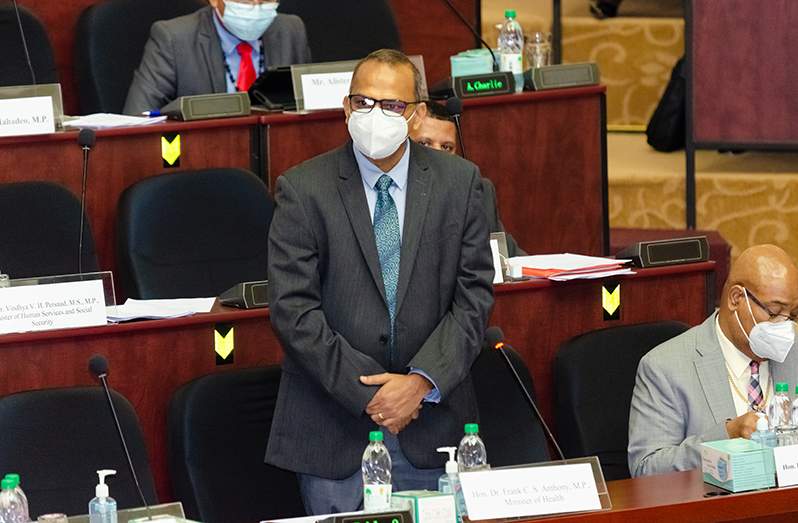— through agreement between African Union, CARICOM
GUYANA is set to receive the largest quota of COVID-19 vaccines it has managed to secure thus far — some 149,000 doses — through an arrangement with the African Union, facilitated by the Caribbean Community (CARICOM), according to Minister of Health, Dr Frank Anthony.
The minister made the announcement on Thursday at the National Assembly, while responding to questions raised by Opposition Member of Parliament and Shadow Minister of Health, Dr Karen Cummings.
“… CARICOM has brokered an arrangement with the African Union and they have set aside 1.5 million doses for the Caribbean and out of that allotment, Guyana’s quota is going to be 149,000 doses,” the minister said on Thursday.
The quota earmarked for Guyana is just less than 10 per cent of the vaccine doses that will be distributed to the Caribbean region. It is not yet clear which vaccine Guyana, and the Caribbean region, will receive through this arrangement but since most of the COVID-19 vaccines are two-dose vaccines, at least an additional 74,500 persons may become immunised with these additional vaccines.
Most of the COVID-19 vaccines are distributed through two-dose regimens because the first dose helps the body to recognise the virus and ‘wake up’ one’s immune system, while the second shot- which is given a few weeks later- helps to strengthen the immune system generated after the first dose.
Already, Guyana will also receive nearly 104,000 Oxford-Astrazeneca vaccine doses from the COVAX facility, a global vaccination alliance, in the coming weeks. This vaccine needs to be given in two doses, which means that 52,000 persons will be able to benefit.
And, on Wednesday, Charge d’Affaires of the Embassy of the People’s Republic of China, Chen Xilai confirmed that the 20,000 Sinopharm vaccines earmarked for Guyana have been approved. Sinopharm is also a two-dose regimen, and this therefore means that some 10,000 persons will be immunised.
Altogether, this means that Guyana has been able to secure 273,000 vaccine doses thus far which could be used to immunise some 136,500 individuals, or approximately 18 per cent of the population.
FRONTLINE WORKERS
The Health Minister has continuously emphasised that the vaccines will be used to immunise frontline workers, the elderly and persons with co-morbidities (other underlying medical conditions) first. There are about 22,000 healthcare workers who are all eligible to receive the vaccines, while the remainder will go to the other two groups.
“We are in a number of bilateral talks with various countries, including China but also Russia and India to ensure that we can have more than that 20 per cent for this year,” Dr Anthony said, adding that the Government is in talks with a number of multilateral agencies and the manufacturers of the vaccines themselves.
What is important to note is that the Government will not be making vaccination mandatory, so persons who are eligible have the ability to opt out of receiving these immunising agents. But, the minister did advise persons who are offered, to take it, since that will help to minimise infections and reduce their chances of being hospitalised.
To cater for the deployment of vaccines, Guyana’s vaccination capacity has been bolstered. Since Guyana was not yet sure which of the COVID-19 vaccines it will receive, in anticipation, the country secured the necessary cold chain infrastructure to ensure that it is equipped to store the vaccines at temperatures that are cold enough.
Additionally, healthcare workers are being trained to administer the vaccines to adults, since a majority of Guyana’s vaccination regime deals with immunising children. Also, since COVID-19 vaccines require two doses over a period of time, copious record-keeping must be done. Health workers must also be trained to spot and treat potential side-effects of the vaccine, though these are not common.
Director-General of the World Health Organisation (WHO), Tedros Adhanom Ghebreyesus, recently lamented the unequal and inequitable distribution of COVID-19 vaccines. Subsequently, the Economist reported that advanced global economies will achieve widespread vaccination coverage exponentially faster than 84 poorer countries, which are projected to achieve that widespread coverage only until 2023. Guyana was listed as one of those 84 countries.
But, during an address to the nation last Saturday, President, Dr Irfaan Ali posited that his government wants to accelerate the rate of securing and distributing vaccines. Widespread vaccination is the “exit strategy” for the pandemic; this means that only when about 80 percent of the population is immunised through vaccination or through recovering after contracting the virus, would there be some sort of ‘normalcy’.




.png)









